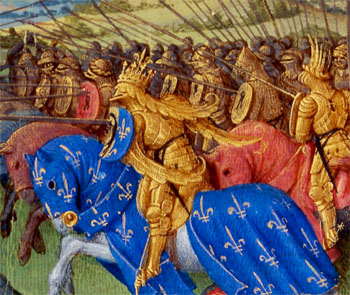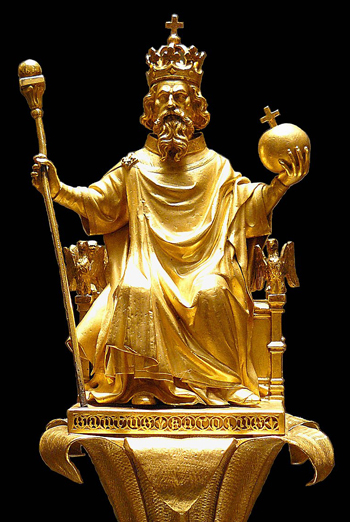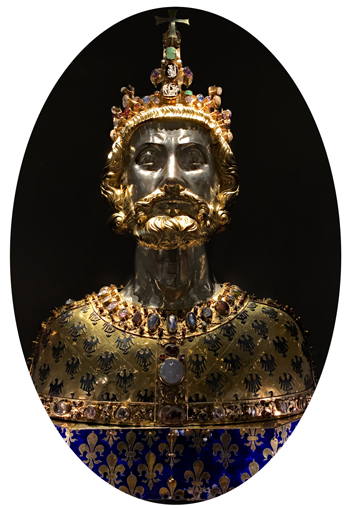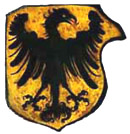Personalities
 |
 |
 |
 |
 |
 |
 |
The Carolingian Light - II
The Charlemagne of the Legend
We can imagine Charlemagne receiving several Bishops in his camp.
He raises up to his full stature and receives the Prelates. What a beautiful encounter of mutual respect: the respect of the layman for the Bishops and the respect of the Bishops for the hero who is the right hand of the Church!
They exchange greetings. Charlemagne invites them to sit: "My fathers, what do you want from me?"
 "We desire this and that…"
"We desire this and that…"
Charlemagne assists them and gives them a little more than what they requested. They make their farewells quite satisfied and leave.
Later, the army breaks camp and goes to another battle or returns to Aix-la-Chapelle, the capital of the Empire.
This was the great Charlemagne. He was a sort of light that made the colors of everything more intense. Near him the Bishops felt themselves more Bishops, sons felt themselves more filial, the warriors, more combative. He had a vital force, a driving force that intensified everything around him. This force came not from power or physical strength alone, but emanated from the mental potentiality of a great soul. Still more – incomparably more – he was the recipient of an ensemble of graces that he irradiated around him, which made him the joy of the Empire.
He became the model for all Kings and all Emperors.
This was the great Charlemagne.
The Father of Christendom
Was he only this? Let me raise a historical hypothesis.
I have the impression that Charlemagne, in addition to being a prophet, was the patriarch of Old Europe. That is, all of Europe was born from his personality. He was the point of convergence of the past and the departure point of the future Middle Ages.
The whole history of the converted barbarians – not of Roman or Gallic Europe but the history of Catholic Europe after the fall of the Western Roman Empire – was a preparation for Charlemagne. And, after him, all of History was but a continuity of his person, until the French Revolution. He is a sort of point of encounter, the apex of two sides of a rhombus. Everything met in him and everything came from him.
This patriarchal gift of Charlemagne, this capacity to be a founder – one man founds a religious order, another founds a diocese, yet another a university – is a glory, because his personality endures as the source of what he founded. Does not this capacity to be a founder of Europe deserve special analysis?
 I am certain that Charlemagne was also the founder of Chivalry. The perfect type that he represented gave to countless men the desire and will to be like him. The archetype of the knight and the aspiration of Chivalry were born from the desire to be like Charlemagne.
I am certain that Charlemagne was also the founder of Chivalry. The perfect type that he represented gave to countless men the desire and will to be like him. The archetype of the knight and the aspiration of Chivalry were born from the desire to be like Charlemagne.
I ask myself whether Charlemagne as founder of Europe did not bear in himself a grace that irradiated from him and with time became Chivalry. Thus all the knights who came afterwards were the recipients of a grace that at depth had irradiated from Charlemagne, just as the members of a religious order are the receptors of the particular graces that irradiated from their founder. The founder is not only the one who established that institution juridically, but he is the one who embodies in himself the grace for that institution to exist.
Thus I do ask myself whether Charlemagne has such a mysterious action on History that, even long after the Great Emperor died, he somehow revived in all of Europe. He would be reviving the graces he received and deserved in his spiritual offspring in a certain way like the graces of Elias lived in Eliseus and continue to live in the Carmelites.
If this hypothesis were proved true, then the kings, the knights, the wise men, the theologians and everything else that existed in the Middle Ages would be an extension of that remarkable grace that Charlemagne received.
This leads us to another point: Is Charlemagne a saint to be venerated on the altar? His life has some shadows. It is similar to the life of King David that also has shadows; nonetheless the Church tells us that David is a Saint and that we can pray to him; we can have a cathedral built in honor of King David.
Therefore, the shadows in David's life do not prove that he was not a Saint, I believe that the fact that he left a great work for the glory of God inclined God to forgive David and to purify his soul? If this is true for David, why it is not also true for Charlemagne? Was he not the Father of Christendom, which was the greatest temporal realization of the glory of God on earth? This is a doubt that remains a question for us.
 As I analyze the text of Einhard in this meeting, I notice that you are all feeling a coruscation from the figure of the Great Emperor. A coruscation, a flash of ligh that is perhaps more intense than what you feel considering the life of some other Saints. Is not this coruscation his shower of roses?
As I analyze the text of Einhard in this meeting, I notice that you are all feeling a coruscation from the figure of the Great Emperor. A coruscation, a flash of ligh that is perhaps more intense than what you feel considering the life of some other Saints. Is not this coruscation his shower of roses?
St. Therese of Lisieux said that after her death she would pour down a shower of roses from Heaven over the entire world. Is there not also a Carolingean, grand, universal, perpetual and perfumed shower of roses that comes from Charlemagne?
I believe that there are two representations of Charlemagne that could be on a double panel: On one panel he is dressed in armor instilling terror in Pavia; on the other, he is seated on a throne in the highest Heaven showering those rose graces over mankind, but roses with a fragrance that encourage us to enter battle.
Is not this shower of graces an extension of the personality and the graces of Charlemagne – that mysterious and mystical Emperor – even into our days? Does he not have a special way to speak to our souls, a way to ignite a light that only he had?
If this is true, is it not the case for us to pray to Charlemagne and ask him to make this light more vigorous in us so that his two aspects – the iron man and the amiable man, the terrible warrior and the paternal giant – are ever more present in the world to raze the mountains and fill the valleys in order to prepare for the Reign of Mary?


He raises up to his full stature and receives the Prelates. What a beautiful encounter of mutual respect: the respect of the layman for the Bishops and the respect of the Bishops for the hero who is the right hand of the Church!
They exchange greetings. Charlemagne invites them to sit: "My fathers, what do you want from me?"

Charlemagne enters battle & inspires all the warriors
Charlemagne assists them and gives them a little more than what they requested. They make their farewells quite satisfied and leave.
Later, the army breaks camp and goes to another battle or returns to Aix-la-Chapelle, the capital of the Empire.
This was the great Charlemagne. He was a sort of light that made the colors of everything more intense. Near him the Bishops felt themselves more Bishops, sons felt themselves more filial, the warriors, more combative. He had a vital force, a driving force that intensified everything around him. This force came not from power or physical strength alone, but emanated from the mental potentiality of a great soul. Still more – incomparably more – he was the recipient of an ensemble of graces that he irradiated around him, which made him the joy of the Empire.
He became the model for all Kings and all Emperors.
This was the great Charlemagne.
The Father of Christendom
Was he only this? Let me raise a historical hypothesis.
I have the impression that Charlemagne, in addition to being a prophet, was the patriarch of Old Europe. That is, all of Europe was born from his personality. He was the point of convergence of the past and the departure point of the future Middle Ages.
The whole history of the converted barbarians – not of Roman or Gallic Europe but the history of Catholic Europe after the fall of the Western Roman Empire – was a preparation for Charlemagne. And, after him, all of History was but a continuity of his person, until the French Revolution. He is a sort of point of encounter, the apex of two sides of a rhombus. Everything met in him and everything came from him.
This patriarchal gift of Charlemagne, this capacity to be a founder – one man founds a religious order, another founds a diocese, yet another a university – is a glory, because his personality endures as the source of what he founded. Does not this capacity to be a founder of Europe deserve special analysis?

A grandeur thant made him the Founder of Christendom
I ask myself whether Charlemagne as founder of Europe did not bear in himself a grace that irradiated from him and with time became Chivalry. Thus all the knights who came afterwards were the recipients of a grace that at depth had irradiated from Charlemagne, just as the members of a religious order are the receptors of the particular graces that irradiated from their founder. The founder is not only the one who established that institution juridically, but he is the one who embodies in himself the grace for that institution to exist.
Thus I do ask myself whether Charlemagne has such a mysterious action on History that, even long after the Great Emperor died, he somehow revived in all of Europe. He would be reviving the graces he received and deserved in his spiritual offspring in a certain way like the graces of Elias lived in Eliseus and continue to live in the Carmelites.
If this hypothesis were proved true, then the kings, the knights, the wise men, the theologians and everything else that existed in the Middle Ages would be an extension of that remarkable grace that Charlemagne received.
This leads us to another point: Is Charlemagne a saint to be venerated on the altar? His life has some shadows. It is similar to the life of King David that also has shadows; nonetheless the Church tells us that David is a Saint and that we can pray to him; we can have a cathedral built in honor of King David.
Therefore, the shadows in David's life do not prove that he was not a Saint, I believe that the fact that he left a great work for the glory of God inclined God to forgive David and to purify his soul? If this is true for David, why it is not also true for Charlemagne? Was he not the Father of Christendom, which was the greatest temporal realization of the glory of God on earth? This is a doubt that remains a question for us.

The light of Europe
St. Therese of Lisieux said that after her death she would pour down a shower of roses from Heaven over the entire world. Is there not also a Carolingean, grand, universal, perpetual and perfumed shower of roses that comes from Charlemagne?
I believe that there are two representations of Charlemagne that could be on a double panel: On one panel he is dressed in armor instilling terror in Pavia; on the other, he is seated on a throne in the highest Heaven showering those rose graces over mankind, but roses with a fragrance that encourage us to enter battle.
Is not this shower of graces an extension of the personality and the graces of Charlemagne – that mysterious and mystical Emperor – even into our days? Does he not have a special way to speak to our souls, a way to ignite a light that only he had?
If this is true, is it not the case for us to pray to Charlemagne and ask him to make this light more vigorous in us so that his two aspects – the iron man and the amiable man, the terrible warrior and the paternal giant – are ever more present in the world to raze the mountains and fill the valleys in order to prepare for the Reign of Mary?

Posted May 5, 2023

______________________
______________________





